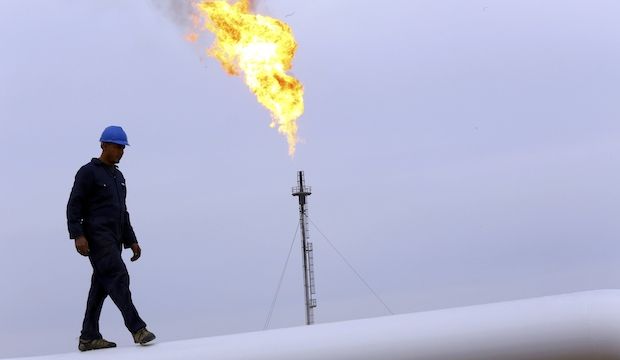
This file photo shows a worker walking on an oil pipeline at the Khurmala oil field on the outskirts of the city of Erbil, in Iraq’s Kurdistan region, on December 4, 2013. (Reuters/Stringer)
Erbil, Asharq Al-Awsat—The Kurdistan Regional Government (KRG) in Iraq will in the next two months raise its oil production levels by up to 80 percent, a senior Kurdish energy official told Asharq Al-Awsat.
Dalshad Shaaban, vice-president of the Energy and Natural Resources Committee in the Iraqi–Kurdish parliament, said that following reports presented to the Committee by the KRG’s Ministry of Natural Resources, “it is expected that the KRG’s oil exports will be increased in the next two months from 250,000 barrels per day [bpd] to 400,000 bpd or 450,000 bpd [or by 60 or 80 percent, respectively].”
He added that the KRG “depended on oil revenues to pay 70 percent of all wages of public sector workers in the region, after they were cut off by Baghdad at the beginning of the year.”
Iraq’s federal government froze all public sector workers’ wages in the region in January following a long-running dispute with the KRG over it’s efforts to export of oil without Baghdad’s approval.
The Baghdad government, then headed by ex-premier Nuri Al-Maliki, said it considered all export of oil from the region independently of the state-owned oil company SOMO as “smuggling,” and vowed to take legal action against both the KRG and buyers of its oil, as well as ending transfers of the region’s share of the national budget.
Officials in Erbil have long complained Baghdad was acting unconstitutionally, contending that both its share of the budget and its right to export oil without Baghdad’s consent were enshrined in the country’s constitution, which also covers the KRG.
Since then, both the security and political environment in Iraq has changed, following the Islamic State of Iraq and Syria’s (ISIS) blitz across large swaths of the country and the appointment of new Prime Minister Haider Al-Abadi.
However, in spite of these shifts, Shaaban remained pessimistic regarding the chances of the dispute with Baghdad being resolved soon.
“I am convinced we will not reach a solution [to the dispute] with Baghdad. Even if we reach an agreement, it would be a temporary one lasting three months only, or perhaps a little more; because this dispute is not about the constitution or about transparent policies [from Baghdad], but is instead related to the mindset of those in power, who have politicized all these issues,” he said.
In fact, it was in Baghdad’s interests to allow the KRG to export its oil independently, Shaaban said, since the country’s 2014 budget had, based on the expectation that oil prices would stabilize at 90 US dollars per barrel, specified an export level of 1.9 million bpd for the country.
But in light of prices falling to below 90 dollars per barrel and Iraq’s not being able to export as much oil as it had expected due to ISIS taking over some of the country’s largest refineries and most important oil installations, Iraq as a whole is currently only able to export a fraction of this amount—375,000 bpd, according to Shaaban.
“The only region [in Iraq] capable of filling this gap is the Kurdistan region,” he added.
Kurdish authorities have regularly claimed the region has oil reserves of some 45 million barrels and that it has the ability to produce some 220,000 bpd.
Shaaban called on Prime Minister Abadi to “visit the Kurdistan region in order to begin talks with the KRG [on the issue] and save both himself and Iraq from this crisis.” He added that a delegation from the KRG headed by its prime minister, Nechervan Barzani, would soon visit Baghdad to “discuss all the relevant issues” to the region with Abadi.
“The KRG has provided Baghdad with all the necessary details, complete with figures and reports, regarding its oil policies. We have asked the Iraqi federal government a number of times now, if they are not convinced by this information, to visit the region to confirm it for themselves, and to examine our contracts with foreign oil companies and observe how we deal with them. But, as I have said before, the problem is not really related to all this, but is instead one of mentality,” Shaaban added.
Speaking to Asharq Al-Awsat, official KRG spokesman Sefin Dzei said the region was eager to export oil and gas to the Eurozone, and said the KRG had held talks with a number of European oil and gas companies to begin operations in the region.
“There is both the capacity and the desire among a number of European companies for this,” he said. “These companies currently have a presence in the Kurdistan region and there is a real opportunity for us to provide European countries with natural gas.”
The freeze in payment of the Kurdistan region’s share of the budget—17 billion dollars—has crippled the region’s economy. More than a fifth of Kurdistan’s 5-million-strong population are currently on the government payroll, and with Baghdad previously forking out all of the 840 billion Iraqi dinars (722 million dollars) that make up these wages every month, the dispute has severely hurt the pockets of ordinary people on the street as well as the KRG.
Dzei said the region now needed some 30–35 billion dollars throughout the next five years in order to beef up its infrastructure and services to “internationally adequate levels.”
This amount was needed, he said, “to develop the country’s education sector, including higher education, and to build bridges and fix roads, among other sectors.”
He added that the KRG was currently in the process of seeking loans from international organizations and that most of these loans would be used for such projects, not to pay public sector wages.
